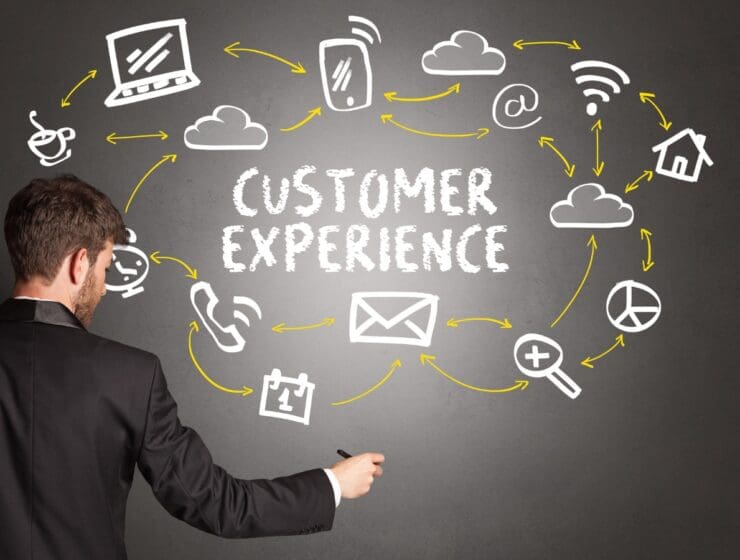Are you attracting customers or just collecting contacts? By Danny Shepherd, CEO of Intero Digital…
Tag: Modern Marketing + Measurement
During Advertising Week’s panel “Prime Time for Outcomes and Creativity,” co-hosted by Happydemics and Olyzon, experts from brands, adtech, and measurement shared how CTV is becoming a critical channel.

The message is clear: programmatic audio is no longer a niche channel.
It’s clear that the consumer information paradigm will continue to shift. The question is: Is your audience data strategy ready to keep up?
Privacy isn’t something happening to advertising; it’s happening to consumers, impacting them in ways they may not even realise, sometimes as simply as the browser they’re using.
Creators are not just amplifiers of culture, they are efficient, scalable, and sales-driving partners. And the data proves it. But only if we treat them like the media force they’ve become and measure them accordingly.
By embracing this role and the principles of data storytelling, we can create more impactful, persuasive, and memorable campaigns.
IF we care about accuracy, transparency and effectiveness, we must adopt a model that gives credit where credit is due. One that reflects the real contributions of each channel, including those without IDs.
Smart automation choices amplify human capabilities, turning good content strategies into great ones through consistent execution and data-driven refinement.
Google’s latest announcement on the future of third-party cookies has sparked a mixture of frustration and renewed urgency across the ad tech sector. We asked leading technology and media experts for their responses to Google’s decision.
Choosing the right MMM tool requires balancing cost, usability, and analytical depth. By carefully evaluating these factors, you can select an MMM partner that aligns with your business objectives and enhances marketing effectiveness through data-driven decision-making.
To effectively reach social-light consumers, brands need to take a data-driven approach to refine their media strategies.
The wave of innovation currently reshaping emotional response measurement replaces such crude techniques with highly sophisticated technologies and processes that enable emotion to enrich demographic data and provide a fuller understanding of how people react to creative output.
As AI continues to evolve, the importance of clean, ethical, and well-managed data will only grow. The time to act is now—because if your data is dirty, your strategy is already broken.
Approaches to brand-safe media buying need to be employed strategically across an advertiser’s plan – not just as point solutions for specific campaigns.
Search offers a far less tactical, far more meaningful way to connect with consumers than it once did when the world seemed simple and Google’s algorithm was the main factor to navigate.
As the industry continues to navigate challenges like privacy regulations, identity shifts, and brand safety concerns, curation offers a path to greater ROI. Done right, it transforms ad buying from a fragmented process into a seamless, results-oriented strategy, ensuring that every dollar spent delivers maximum impact.
We must stop treating historical measurement as the endgame. True marketing effectiveness comes from the ability to simulate future outcomes, forecast returns, and guide strategy dynamically.
Ice Heggedal, marketing acquisition team lead at Usercentrics, began her presentation with the story of how she went from just being a performance marketeer, to becoming a privacy-led marketeer.
Knowing that product discovery is only the first of many on- and offline touchpoints before purchase gives marketers the opportunity to meet consumers where they are, provide the right information at the right time, and ultimately drive higher conversions.
The media industry is constantly evolving, with new technologies, platforms, and regulations reshaping how advertisers and publishers operate. As these changes unfold, the importance of well-executed research grounded in industry expertise will only grow.
A privacy-centric world isn’t coming—it’s already here. And in this new, more complex reality, brands can’t rely on yesterday’s playbook.
It’s time to stop chasing fleeting attention and start building communities that thrive. The rewards? Loyalty, advocacy, and the kind of trust that turns customers into lifelong allies.
If you’re a small business owner yourself, the message is simple: Stay adaptable, keep innovating, and never stop connecting with your customers.
Instead of navigating to specific apps, websites and search results, people will simply pull up videos, articles or even audio when they want it.
Those who act swiftly to integrate this technology will find themselves well-positioned to capitalise on the benefits and put in place a strong foundation for sustainable growth.
Precision in advertising lays the foundation for lasting business success by enhancing customer engagement and sharpening financial planning.
The intersection of advertising and market research offers a roadmap for both industries to combat fraud and improve data quality.
When it comes to identity resolution, remember: owning your data means owning your customer relationships—and your future.
Much has been written about the benefits of supply-side curation, but overviews of how to curate inventory – and how this represents a step change from historical approaches – have been generalized at best.
The question isn’t whether you can afford to invest in customer centricity—it’s whether you can afford not to.
Combining old-school approaches to data collection with cutting-edge statistical modelling gives the best of both worlds between detail and scale while creating a data market where people are active participants rather than unwitting — and, often, unwilling — data mules.
With any in-house advertising planning models, the platform approach to integrating and utilising data is critical. Key to success will be finding a platform with the coverage required to ensure accurate campaign planning and the cost points needed for the business case to stack up.
By addressing the people side of change, organizations can increase the likelihood of successful implementation and achieve their data management goals.
True accountability goes beyond clicks and site traffic. It means aligning with business outcomes that drive long-term growth and brand equity.
The successes of today’s biggest brands illustrate how next-gen stats can inform smarter, more effective advertising strategies. The lesson is clear: brands that embrace these insights gain a competitive edge in today’s crowded media landscape.
Advertisers face an uncertain cookieless future in 2025, but they are galvanized more than ever to identify a better path forward.
By grounding our creative processes in data while nurturing human insight, we create campaigns that are not only effective but also unforgettable.
Companies that embrace privacy-forward data collaboration will gain a competitive edge, while consumers will be more inclined to share data with brands they trust.
Shopping, browsing, learning and playing online doesn’t have to feel like you’re being taken advantage of by cookies. Instead, every experience should feel like it knows you and understands how best to serve you.
With new tools and platforms, collecting and leveraging zero-party data has never been easier—or more impactful. It’s time to embrace this new era of marketing, where your customers tell you exactly what they want, and you deliver with precision and authenticity.
For those looking to maximise opportunities during this retail Golden Quarter, it’s important to strategically enhance the business’s ability to engage in data collaboration. This will allow them to fully access customer insights available within privacy-focused clean rooms and across the full variety of channels and data environments. Securing long-term and effective outreach to high-value audiences in the run-up to Christmas and beyond.
As Oracle exits the advertising business, the industry is confronting a significant shift. Oracle’s suite of tools—built through a series of key acquisitions such as Crosswise, BlueKai, Datalogix, and Grapeshot—has been foundational for many marketers, data providers, and platforms. With Oracle’s departure, these stakeholders are now facing the challenge of finding reliable alternatives to maintain their data-driven strategies.
We are all hoping to see even more interesting data visualizations for the 2028 Los Angeles Olympics. Until then we will put data visualizations to great work uncovering opportunities to improve and grow our own organizations.
Google has, perhaps inadvertently, created the opportunity and impetus for marketers to test, validate and now outperform with a new—and improved—combination: iOS + Alternative IDs.
By rethinking data strategies and considering integrated solutions, marketers can turn their current data overload into an insight and action-oriented machine and stop wondering when the payoff will happen, because it will already have happened.
For companies to overcome the so-called “trough of disillusionment,” they need to identify the solutions and strategies that deliver clarity. They need to embrace AI. Not just as a term but as a use case.
As privacy regulations tighten and consumers become more aware of how their data is used and misused, adopting privacy-first advertising strategies is not only compliant, it also builds consumer trust.
To those in the digital advertising industry, another twist in the tale of the cookie deprecation was not unexpected. But that Google would seemingly renounce its promise to cut off these third-party identifiers all together, was abrupt to say the least.
To maintain and grow revenue into the future, publishers need a fundamental understanding of today’s addressable advertising solutions and how they’re evolving.
Adapting your digital marketing strategy to market trends and consumer behaviors is crucial for staying competitive. Thankfully there are many tools at your disposal to not only keep up with trends, but also leverage them to your competitive advantage.
Companies that successfully capitalize on this opportunity will deliver more personalized customer experiences, enhance their reach and scale, understand the effectiveness of their campaigns, and forge new and innovative partnerships.
By developing a connected system that stores all their data and facilitates continuous learning, companies can generate more informed and creative ideas, driving innovation and staying ahead of the curve.
Generative AI plays a distinct role in leveraging first-party data compared to regular AI by not only analyzing and predicting based on data but also creating new, unique content and experiences tailored to individual users.
Poised to become one of the fastest-growing sectors in advertising, U.S. political ad spending is expected to reach more than $12 billion in 2024. For publishers, that’s too large of an opportunity to miss.
Through new attribution studies, the companies prove how effective bus advertising is up and down the funnel.
Yes, it may be scary to try something new, especially with large uncertainties in the world of digital advertising. Will that ever stop, likely not, so advertisers better buckle up, and try to be a first or second mover as it does not cost a lot to prove that you can still reach your goals in the future, a future without cookies and – who knows – with or without the Sandbox.
Through collaboration in innovation, connection in planning and standardisation in measurement, as a collective we will continue to provide our shoppers with the most inclusive and efficient path to purchase.
By embracing these solutions, we can redefine media strategy and execution standards, ensuring relevance and success in the modern media landscape.
With today’s voter spending more than 70% of their time away from home and increasingly blocking ads online, political marketers simply cannot afford to skip out on DOOH this election season.
Establishing a method to connect your best data with identity-based solutions across partners and channels will pay off now and into the future.
The journey has changed, along with the channels and buyers themselves. B2B marketers must be prepared to meet them in their new reality.
2024’s Red Carpet season has demonstrated that the right celebrity partnerships have an extraordinary power to amplify brand affinity and share of voice.
To survive these stormy seas, we need to break down the walls both within and between the many component players in the digital advertising ecosystem, embracing a “rising tide lifts all boats” mindset.
The death of third-party cookies isn’t a return to early digital marketing, rather it will lead to solutions that will balance the needs of consumers privacy and digital marketing.
Harnessing data strategy in fundraising is a key way for charities to navigate the prolonged financial pinch.
By Angie Vaughn, Director of Marketing for Wripple Recently Wripple conducted our third Team Up…
Until these systems start leveraging other bidstream signals for targeting, frequency capping and attributing performance, ongoing abuse of that first-class identifier will likely persist.
Success lies in the willingness of advertisers to experiment and iterate across the four critical dimensions: optimization signals, targeting, creative content, and channel selection.
Understanding consumers is the foundation of effective marketing, not just a strategy. It is crucial for every team to collaborate and grasp the significance of research to enhance the impact of their work.
Winning over individuals is hard enough, let alone groups, who don’t want to engage or be influenced.
The reach crisis facing advertisers is evident, but it doesn’t need to be a problem, providing advertisers and publishers explore technologies that will enable them to work closer together.
Where Google still leads, based on data from Rise at Seven, is on searches for activities nearby, including events and entertainment, ahead of both TikTok and YouTube.
The tools to create a more transparent, ethical, and trustworthy industry are here – and they are actionable and easy to use.
Marketers are constantly seeking new ways to leverage insights to inform their strategies. The ever-evolving data driven marketing landscape is the latest frontier for marketers, presenting challenges and opportunities alike.
Bid shading is a feature that enables buyers to leverage historical and predictive data to influence the bid price in a programmatic ad auction.
The demise of the third-party cookie heralds a new era for marketing and how it measures its success.
Success ultimately comes back to understanding who your customers are. It comes back to combining the functional and emotional sides and working out which parts of the customer’s relationship with your brand actually matter to them.
To win this holiday season with both Spenders and Savers, brands need to fuel their holiday campaigns with comprehensive and continuously updated data.
Ultimately, it’ll be up to marketers and brand leaders to determine what to look for in a clean room, and when the right time is to implement one.
With evolving technology, marketers are learning how creative personalization can drive better outcomes, from brand engagement to sales revenue.
We can solve the challenges of campaign quality, data breaches and violations of privacy through rigorous processes and certification. Yes, it’s expensive, but it’s worth the protection against the risk of a billion-dollar problem that can affect tens of millions of people worldwide.
Clean rooms, in summary, represent another tool in the marketers tool box, and are only as useful as the data that goes into them.
There’s still time for marketers to embrace a new privacy-first paradigm whose scalability matches the ID-based practices the industry has relied on thus far. However, the clock is ticking.
To demonstrate the power of optimizing in-campaign, we studied several campaigns that underperformed and estimated the approximate amount of increase in brand lift if the campaign prioritized the best-possible optimization.
Data is a fundamental requirement for advertising to continue succeeding as much as it is growing.
While the road ahead may be long, AI Orchestration holds the potential to unlock the true value of data, making it a transformative force in the business world.
From retail to tech, customer obsession is a foundational mantra that helps businesses excel. Let’s explore why this is the case and how customer obsession can benefit your business.
As data collaboration becomes increasingly pivotal for business success, companies must stay aware of the nuances necessary to keep private data useful and useful data private.
There is no better time for a change like this to come along at the DSP level. With many B2B companies trying to do more with less right now, anything that adds efficiency and potentially boosts performance is welcome.
Americans are craving content that is reflective of all diversities, and not just the historical majority. Accurate measurement that captures diverse audiences is paramount to engaging and reaching these audiences and will be critical for brands’ success.
Attention metrics are well on their way to transforming the way the digital advertising industry not only delivers campaigns, but the way outcomes are measured and judged.
While viewability is a measure of an opportunity for an ad to be seen, attention measures whether the consumer saw, liked or engaged with the ad.
As the world of digital advertising enters the next era, personalization will continue to play a huge role in achieving great marketing results.
With so much saturation, consumers easily become blind to advertising and it’s harder for the brand’s message to have any meaningful impact.
With an overhauled meaning of the language, what the data marketers are expecting to see will be vastly different. This is one of the major sticking points for those transitioning to GA4.
The volumes of media data that marketers deal with will only continue increasing. This means maintaining a unified source of clean media data has to be an ongoing task.
In confronting the realities of data loss from changing regulations and standard industry practices, publishers need to look beyond quick fixes and to think long-term.
Better targeting, engaging and converting of back-to-school shoppers requires unparalleled activation data.
Marketers were once able to rely on third-party cookies and other identifiers but, as these fade away and privacy regulation grows, they need to consider ways to continue delivering relevant advertising while ensuring they keep customer data safe.
Let’s cover how agencies can implement automation to boost efficiency, decide what to automate via external partners and what to automate in-house, and identify next steps to reap the benefits of automation.
When it comes to clearly defining advertising performance and effectiveness, the substance means the difference between wasting spend or positively impacting the business’s bottom line.
The possibilities here are endless and extend across verticals – particularly those who traditionally have been data-poor, like automotive manufacturers.
As the digital advertising landscape has evolved into its current form, it’s evolved into two distinct areas, both essential for marketers: the Big Tech walled gardens, and the open web.
It’s a bit late now to be considered an early adopter, but there’s still time to switch over to GA4 before Google forces everybody to.
Can we claim to understand a person if we overlook the content they consume, the information they engage with, the contexts they navigate?
There are three steps you need to follow if you want to succeed with your data strategy: pick your objectives, build the data foundation, and then activate data.
As the industry continues to grapple with obtaining usable attention metrics, neuroscience provides a path to better outcomes that are increasingly agile, affordable and accessible.
Zero-party data, information shared directly by consumers offer compelling opportunities to leverage existing digital infrastructure to collect customer data.
It is clear that having clean customer data delivers a better understanding of customers, improves targeting and ensures a standout customer experience.
For adtech companies, it’s a question of who can adjust soonest to be the pioneer who powers the shift from the open market to direct.
Applying test and iterate methodologies, and empowering marketers to make adjustments with pace, will become the centerpiece of the work.
Like any dependency, the industry’s reliance on tracking cookies can be replaced by habits that are both more sustainable and beneficial.
While cookie based audiences are easy—simply select the audience you want to target in your DSP of choice—business data integration requires APIs and manipulating the bidder through different integration points.
Although the GDPR was introduced with the aim of protecting personal data, its effectiveness has been undermined by several key factors.
These privacy-by-design solutions will allow companies to build their audiences ethically and effectively.
Sellers of digital media must continue to demand a more efficient, transparent and sustainable supply chain that delivers on the true promise of programmatic.
Best practices for collecting, controlling and capitalizing on first-party data assets
Many companies with highly secure data processes are going to be resistant to major sudden changes.
How your data teams can serve as a catalyst to regaining momentum against the industry’s most vexing challenges of 2023.
How data can be used to refine targeted campaigns, acquire new customers, and launch new services.
In this article, we’ll explore the role of data analytics in the future of customer experience and the best practices.
In funnel speak, marketing should start near the narrow end, with contextually relevant information served to consumers when they’re ready.
Thousands of companies rely on these technologies and disciplines because each of them brings something valuable to the table.
SPO solutions are becoming an increasingly vital tool for brands looking to reach audiences in a more efficient and thoughtful way.
With the disappearance of cookie-based advertising on the imminent horizon, brands should embrace personified advertising.
During times of uncertainty, there’s a critical balance to maintaining the stability of our brand voice while also adapting in a rapidly changing environment.
Currently, to receive privacy-compliant campaign insights, most marketers are relying on Google and Apple to build a picture of attribution.
The winners from yesterday may not be winners tomorrow; success may depend on their ability to look at opportunities with fresh eyes.
Markters doing due diligence upfront is essential to preventing wasted spend and having headaches down the road.
March Madness and other tentpole sporting events are rightly seen as key opportunities for every marketer out there.
Media measurement as a field is experiencing massive disruption right now. From its outset, it never gave a holistic audience understanding.
Get comfortable with “walled garden world” scenarios and prioritize investments in media, technology and data capabilities accordingly.
Maximizing creativity, with the power of data and purpose, is where brands can differentiate themselves from their competitors
App marketers should be smarter with spending and reinforce the foundations of their strategies with an understanding of their user personas.
How clean is your data? It’s an important question, but one that doesn’t often get addressed — at least not at the frequency necessary.
Most brands aren’t of this other part of identity resolution, which relies on matching logic and an identity graph to connect data.
All these considerations—capability, technology, and culture, really need to be assessed by marketers before any partnership proceeds.
Online retail, with its vast first-party data, provides an ideal environment for brands looking to target customers in a relevant context.
AWS is in a prime position to dominate the clean rooms market through sheer force of their existing cloud services market share.
Look beyond superficial data and dig into app usage, which can help paint a clear picture of where people are spending their time
As our industry fights through to the other side of the cookie era, one thing is clear: Replacing the cookie will not be easy.
We asked industry experts to share their thoughts on the latest findings.
With collaborative insights made possible through data collaboration and clean rooms, marketers will be well on their way to accelerating business transformation in 2023 and beyond.
IP address intelligence data won’t stop criminal cyber activity, but it can provide an additional, valuable layer of protection for in-house teams or MSSPs
With the clear value search data can demonstrate, brands that place it front and centre will gain a clear view not only of a moment in time, but also – crucially – of predicted consumer behaviour in 2023 and beyond.
The cinema advertising transformation is very much still underway. As they say in the ‘biz, the camera is still rolling.
A wealth of opportunities have opened up for the post-cookie era thanks to advances in AI technology.
To continue to reach consumers, advertisers must work with publishers via a privacy-safe tech infrastructure to find, scale and activate their consented consumer data, including the opt-out consumers.
Understanding household composition, from occupant life-stage to individual habits and preferences, is the new battleground for data integration and interpretation.
Zero-party data is here, and it’s here to stay. Undoubtedly, consumer data privacy must take precedence and brands’ strategies are yet to be fully defined. But joining the “zero-party party” is now a vital part of customer engagement strategy success.
Data collaboration, when executed in a way that preserves privacy and enhances customer experiences at scale, will transform business. I can’t wait to see what 2023 has in store.
Choosing the right demand partner is important to ensure your business is running smoothly, cash flow keeps coming, and you aren’t being taken advantage of through sneaky clauses or unfair terms.
In the final quarter of this challenging year, marketers can be reassured that the tools to withstand the additional pressure of delivering both efficiency and performance from media investments are readily available in programmatic media.
Meet regulatory standards, avoid costly penalties, keep your sensitive data well-protected, and know what to do if you suffer a cyberattack.
In today’s digital-first ecosystem, data is an abundant resource, requiring companies to isolate the data that matters most, converting information into actionable insights.
With privacy-first data practices becoming standard in the industry, marketers are looking for other resources when it comes to gathering potent insights.
In the wake of the pandemic, brands must navigate complex and sensitive issues, from intensifying political polarization to calls for social justice and a looming economic recession. Meanwhile, whether it’s the deprecation of the cookie or the launch of new platforms, technological change is accelerating.
Using a few simple generic attributes like time, location, and genre, it’s possible to deliver dynamic and personalized content that aligns with a listener’s interests and immediate circumstances.
It’s easy to see how brands that embrace the new rules of the road will position themselves for success.
First-party publisher data in marketing campaigns will play a major role in building a more responsible web. So advertisers and publishers must combine forces to restore consumer trust within the digital marketing industry.
Because creepy is still creepy by any other name, the cookie is not coming back. But adtech companies, advertisers, and publishers do not need to cry over spilled milk.
When seeking a partner to help navigate the post-cookie world, partners who have relied on cookies in the past are likely to deliver tactics that have been seen before. In contrast, partners who have never relied on cookies will likely provide much more dynamic solutions.
These capabilities will enable digital advertisers to continue providing a truly personalised experience for their users.
When fighting for attention has become harder than ever, data is our best ally to supercharge creative thinking.
This bigger-picture approach means feeding smart TV data into the wider sphere of rights holders and marketers, to shape a common value currency.
Saying goodbye to bias in ad targeting isn’t just the right thing to do, it’s also a pretty lucrative business driver for any scaling brand.
As the industry learns to adapt to the evolving privacy landscape, app developers need to find new ways to bridge the gap between fragmented and incomplete data.
A shift to direct sales, proprietary audiences, and contextual targeting will indeed be very challenging for one segment of the open web: low-quality long-tail sites.
Using personalization data allows sales professionals to break through all the noise and make a real connection with people on the first try.
Businesses that free themselves from the reliance on outdated tracking methods and digital modeling will be able to build more valuable customer relationships and weather an unpredictable economy.
Finding partners who have their own inventory — be it a specific distribution network, platform, or person — will be key to advertising in the new age of mobile marketing.
We are excited to announce the release of Claritas Attribution 3.0, which brings significant improvements to the accuracy and breadth of reporting available from our suite of Optimization solutions.
The Claritas Identity Graph powers a full suite of solutions to help marketers maximize their efforts across the entire marketing spectrum.
Personal data is a hot commodity; it’s the fuel of marketing. By offering consumers a fair value exchange for their data, brands can topple the tech giants’ data monopoly.
When it comes to upskilling there’s no time like the present.
Thanks to the greatly improved state of data analytics and measurement, if you embrace this holistic approach, you will benefit from an almost constant learning state.
If a campaign’s tactics and messaging aren’t adapting to voter reactions to real-time shifts in the macro environment around them, they very well might end up as the next case study in “how did we not see this coming?”
Cookie deprecation is causing a good deal of anxiety in our ecosystem—even with the recently announced Google Chrome reprieve of its disappearing cookie until 2024.
In 2021, WHISKAS® worked with MediaCom and Amazon Ads to better connect with tech-savvy pet owners.
Sanjay Nazerali of dentsu X dives into how companies can connect with consumers in more meaningful ways through purpose, messaging, and action.
Brands and marketers need to look at the new privacy ecosystem not as a threat, but instead as an opportunity.
There’s little doubt that video content marketing works, which is why so many brands use it. The key is to exercise thoughtfulness and patience when it comes to evaluating each video’s success.
By ensuring these five areas are working together in harmony, marketers and advertisers can ensure that they are able to harness the power of attention within their campaigns.
As we move to a world beyond cookies, as an industry we have the opportunity to build a better internet that is based on new levels of trust and understanding, but which preserves the value exchange of relevant advertising for amazing, free content.
For businesses assessing the programmatic industry, long-term thinking should become standardized, with companies proactively building privacy into their infrastructure and practices. Businesses that wait will fall behind.
A Q&A with Chris Hogg, Global Head of Platform Sales at Lotame
Now is the time for action. Begin testing different solutions that do not rely on identified users and develop effective strategies that can deliver performance and scale.
Making Waves: How Coca-Cola Wows Customers Every Christmas by Leaning Into Creativity and Innovation
Coca-Cola has become synonymous with the magic of Christmas and every year they find new ways to delight and engage their audiences.
Jennifer Pelino, EVP Global Media, IRI, sits down with Amazon Ads to share how her company is using audience and brand insights to help build meaningful connections between brands and their customers.
When advertisers securely share first-party data with the supply-side, retailers and publishers can segment their respective audiences for targeting on their sites.
If advertisers can look beyond the chaos of the current moment to see the opportunity that it presents, they will find new spaces to innovate, grow, and thrive even in the challenging conditions that lie ahead.
The industry’s reliance on data to create relevant campaigns has led to an explosion of automated technologies to process and analyze the available data more efficiently.
The historical dominance of the walled gardens doesn’t have to be forever. Industry dynamics in 2022 are uncertain and in flux.
Thanks to advances in technology, engineering, and — perhaps most importantly — AI and ML capabilities, platforms and brands can individualize interfaces to meet users’ needs.
An effective measurement framework will give you the data to continue moving the business forward and serve your customers’ needs.
Will we all learn from Julia Child and start asking questions, listening, and responding with care and interest? As Julia proved, it’s a time-tested approach.
Publishers and advertisers alike are gearing up for a new world of addressability where interoperability is the best path forward for all parties.
Industry leaders are collaborating and dedicating significant resources to addressing the pending seismic shift in data collection and its impact on programmatic advertising.
No matter how much change comes our way, due to regulation, platform moves or otherwise, our respect for data driven marketing can and will live on. But, we have to look beyond the marketing plan to ensure that we are putting data analytics to the best possible use.
Through audience insights and creative experimentation, brands can create an advertising experience that informs, delights, and entertains viewers and helps them discover the products or information they want and need.
If we don’t start respecting consumers’ inboxes and letting them control their data, they will continue to rely on machine-generated emails like Apple Hide My Email, Firefox Relay, and more.
Advertisers chasing their tails trying to achieve something that isn’t even possible, even if they know that’s true.
Sentiment based analysis and targeting brings back to advertising the understanding that human behaviour is often complex and contrary, meaning that delivering the right messages to them requires a subtle mix of art and science.
Data phobic CMOs are afraid to test new creatives and unable to prove the value of campaigns to their board.
The end of third-party cookies is already underway and Apple’s App Tracking Transparency (ATT) feature is an early example of a more privacy-focused approach.
The incredible set of unique circumstances informing sentiment and motivation at the individual voter level in 2022 is beyond human computing or imagination.
A Q&A With Claritas Senior Vice President Quinn Jalli
To connect with consumers in a meaningful way, marketers must ensure their branded message is presented in fully on-screen formats to attract attention and solicit engagement.
One thing is certain: personalized advertising already provides limited knowledge of users’ interests and will soon disappear. Contextual and semantic targeting alone won’t be enough to thoroughly understand online users.
We’re at a pivotal crossroads in the data-driven marketing world, and first-party data owners have a unique advantage when turning the corner.
Cookies have become an easily abused technology, but how did we come to rely on them in the first place, and what does their demise mean for the future?
There’s only one true way to maximize the return on investment (ROI) of your campaigns. It involves precisely measuring campaign results.
No single medium is more important for today’s brands and advertisers than streaming video.
As the debate continues over the creation of in-house media agencies, the decision to in-house media data should be a no-brainer for global brands.
The next phase of innovation for contextual targeting will see creatives and attention-based measurement create the “The Mindset Matrix”.
When a TV buyer can capture ad exposure over multiple weeks or months, marketers will get a more detailed and reliable understanding of frequency, timeliness and what actually drove an outcome.
To reach the best online retail shopper, it’s vital to know who they are, what they prioritize, what they buy, and how they buy.
Despite the challenges that keep marketers up at night, Claritas can help solve them.
By the time they reach your doorstep, a buyer’s journey is mostly over. At this point it helps to understand that journey at a company level, especially within your own website.
If TV providers want to maintain the value of their content, they must fight for the right measurement that does an adequate job of tracking how many people see the ads on their content and how those ads impact their audiences.
While historically, CTV has been viewed as supplementary to linear TV buying, we’re moving into a world where it’s central to a TV buying strategy.
Metaverse marketing techniques can impersonate modern footprints to compose smart technology. However, more consumers need to experience the metaverse and provide valuable feedback.
Too many adtech companies are trying to maintain the status quo (and the arms race that goes with it) that we’ve all lived with for 15+ years.
There are still some unknowns on the horizon when it comes to how a fully cookieless digital landscape will operate in practice, but that doesn’t mean brands and agencies are directionless.
Harnessing first-party data, and ensuring it’s frequently audited will offer a trustworthy foundation to build on. Marketers who start now will have the benefits of valuable insights into their customers’ needs and preferences.
As cookie depreciation bears down on the industry, an influx of cookieless targeting solutions are proliferating the marketplace, with the latest solution to be released being Google’s Topics API.
The customer relationship is already valuable to the brand, and a thoughtfully-managed brand can provide immense value to the engaged consumer by way of continuing education, special offers and things like loyalty programs.
By Caroline Hugonenc, Global VP Insights & Research, Teads There has been a long understanding…
As programmatic advertisers look to identify and reach their known, and unknown, audiences, they’ll need to continually look at how to use the best data science at their disposal to find the overlaps, unexpected correlations and audience pathways.
How can brands continue to find safe and engaging ways to connect with consumers in this complicated environment?
Emerging Social Commerce Channels Requires Innovative Measurement Tools By Jeff Bander, Head of U.S., Eye…
Technology can help us truly understand the context of a digital environment and pair that with dynamic and engaging ad creative in real time. And when you get that right, consumer attention naturally follows.
The future of television is before us. It will be connected, measured, targeted and engaged in entirely different ways than we have seen in the past half century.
Recent research suggests 76% of customers want brands to do more to control personal data. In a world of instant personalization and constant multichannel interaction, brands need to analyze and react to this data in real-time.
For publishers, 2022 may be the last year of easy access to scalable audience data.
While it may seem at first glance that the advantages of advanced marketing technology reside out of reach for smaller, less sophisticated advertisers, the fact is that the greatest benefits of modern marketing technology are most readily beneficial to the most modest businesses.
Frequent guest of the podcast, Claritas’ own CTO, Al Gadbut, joins us for the first in our newly shortened 20-minute episodes, Identity Resolution: The Multibillion Dollar Industry.
Now is the time for businesses to go the extra mile to show consumers that they are invested in creating reciprocal value, something that not many audiences are convinced of.
Ultimately, replacing third-party cookies is about the industry working together to help brands connect with people in a responsible and privacy-compliant way.
Taking a dedicated, strategic approach to this key medium can help to develop better ads for candidates and deliver more relevant ads to viewers.
As the nation continues to diversify, brands must broaden their ideas of a target audience. They must move away from defining their consumers in traditional, broad segments like Gen Z or Gen X, and understand the diverse range of individual needs.
Like the tectonic plates that shift beneath our feet, the digital advertising industry is in a state of flux. The landscape as we know it is changing dramatically, driven by a series of dynamic forces that create both opportunities and risks.
As the industry waves goodbye to the cookie over the next two years, the conversations have to move beyond vilifying one data collection methodology while championing another and focus more holistically on actionability as well.
Marketers can lay the foundation for a privacy-safe strategy by assessing their current data practices, minimizing data collection, privatizing information, and clearly communicating with customers.
Both advertisers and publishers are making efforts to harness first-party data and develop new solutions as well as leverage alternative user targeting methods to help restore trust among sceptical digital consumers. While this intent is commendable, the ecosystem has a long way to go to develop a credible solution for the loss of third-party cookies and MAIDs.
The entire industry, including publishers, must continue to take positive steps forward on this journey to privacy, compliance, and respect.
The right Identity Graph plays a critical role in ingesting that data and creating those linkages to determine what consumer behaviors the campaign influenced.
The time has come for publishers to hold themselves accountable and play their part in bringing transparency to the industry. It starts by understanding that ads.txt is a great tool that should be utilized to its fullest extent.
Ultimately, as AVOD’s value and affordability inspire European households to switch to ad-supported content, brands are presented with a golden opportunity to reach addressable audiences at scale.
Those who participate in a balanced collaborative ecosystem will be able to grow addressability across video and TV environments, create new and high-value first-party audiences, and overcome historic silos between linear, digital video, and CTV to measure and value holistically and at pace with modern viewing habits for the first time.
5 recommendations as to how marketing and communication teams could adapt their approaches to connect and influence at a ‘mindset’ level, rather than pinning ads or strategies on a generation or an outdated demographic.
CMOs are analyzing an array of datasets to answer questions about their brand – and they want those answers today.
While it’s tempting to look at sales as the final story, customer engagement means playing the long game—investing in LTV, the lifetime purchasing value of a relationship.
The changes taking place in the digital marketing industry cannot be overstated – we are entering an entirely new era of advertising that will demand unique approaches from brands and marketers.
With around 3.9 billion global active users on social media, brands have to be on all platforms to make it big and reach half of the world’s population – what a gold mine to tap into!
Check out the latest eBook by Claritas, the industry’s leading provider of segmentation models for marketers.
Overall, the data supports how younger people are more willing to travel during this time, and as such hotel chains are making sure they reach them in the places they visit the most.
We get blindsided by digital, but usually identifying specific groups of people to target is a really powerful way to start testing performance. The key to delivering this is the humble postcode.
DTC brands are leading the way, showing how to reach audiences with relevant ads, while using data-driven insights to prove performance.
Navigating the media world has become increasingly difficult for advertisers as there continues to be an ever-growing number of agency, or agency-related parties and external supplier influences involved in the delivery of campaigns.
The takeaways are clear: the sooner solutions like LiveRamp’s Authenticated Traffic Solution are implemented, the more time there will be to test and iterate, providing consumers with the value experience they expect.
Campaigns in the omnichannel environment might be better thought of, not as branches on a tree, but as snowflakes: a vast range of unique moments with shared characteristics.
The 50+ audience is in the best position to travel, and they’re making plans now for some long-awaited “trips of a lifetime” in 2022. Help them safely get back to doing what they love, and you’ll soon be destined for new levels of growth.
While some organizations have deep data on their individual customers, few have the breadth to compete effectively without collaboration. Leveraging your best data along with another company’s best data has become a competitive necessity, giving you a breadth and depth of insight you may lack.
In the week leading up to Thanksgiving and Black Friday, BrandTotal analyzed paid social media ad campaigns for 28 top retailers, including Walmart, Target, Costco, Macy’s, Best Buy, Home Depot, Nike, Nordstrom, and TJ Maxx — here are the findings.
This shopping season, marketers face a dynamic economic and social environment. Only by having an advertising strategy that is agile, responsive, and omnichannel can they be confident in their campaigns.
The current global supply chain is complicated and only getting messier as the holidays are near. Hopefully, some help will be on the way soon.
Data is the most powerful weapon available to brands in the streaming wars. Combining strong measurement with curiosity and creativity will allow these brands to compete in this hyper competitive environment.
Brands are mired in rules, but short of the tools required to automate and enforce privacy at scale.
Models built on anonymous, cohorted data give retailers the ability to target based on category or brand purchases while respecting individual’s privacy, assuming the seed file is excluded from the audience. High quality models can create addressable segments that predict purchases with better than 90% accuracy.
Regional buys, targeting streamers specifically, are quickly becoming the next logical step in a comprehensive media campaign.
As new solutions emerge to target audiences, both organizations and consumers must play a role in creating a more transparent and secure ecosystem.
While the 2021 holidays will be much different than last year’s due to the COVID-19 vaccine, consumers will continue to shop online instead of going into stores.
Most are very aware of the common consumer in-store checkout experience – items are totaled, the price is tallied, and the consumer exchanges cash or credit for their goods, which are condensed into a bag for easy carrying and accompanied by a receipt as proof of purchase.
2020 was the biggest holiday season ever for marketers and retailers—and 2021 is shaping up to be even more competitive. Give yourself a head start by getting your programmatic strategies in place now.
From a global pandemic to a racial justice revolution, these past 18 months have accelerated cultural change and demanded that advertising keep up in order to stay relevant.
B2B brands are not selling to companies, they’re selling to people. And the reality is that people have come to expect targeted, personalized messaging that’s relevant to their needs in their own lives.
Dark marketing is a useful tool that allows brands to engage with consumers like never before, and will become substantially more important with the absence of third-party cookies.
Streaming TV has not only become the most popular form of TV entertainment for audiences, but it has also edged out the linear broadcast for the first time this year.
Given the lingering impact of the pandemic on attitudes toward travel, it’s more important than ever that marketers be able to operate with scalpel precision in targeting their ad spend.
A recent Nextdoor survey found that 73% say neighbors are their most important community. This enthusiasm for the neighborhood extends to nearly every aspect of their lives, from how they’re socializing to which businesses they’re supporting.
For too long marketing professionals have been too focused on the wrong metrics, or the metrics they use can be misleading.
TV has converged with digital-like campaign measurement and full funnel outcome-based insights are available across nearly all varieties of TV campaigns.
For the past decade, global supply chains have been running a seemingly normal path. Even a year and a half later, industries across the board are experiencing the impacts of supply chain disruptions. With massive labor shortages and continual shipping delays, there is increasing desperation to return “back to normal.”
As organizations continue to recover from changes and setbacks brought on by the COVID-19 pandemic, marketing teams will be critical cogs in the engine of innovation to move forward. In order to be successful, the CMO and CTO need to be more aligned than ever before.
The most important step a leader can take to meet employees where their values are is to establish a culture of trust and empowerment. I only have to look at my own career to see how much this impacts employee and company performance.
With so much focus on how to establish and target audiences in a cookie-less advertising landscape, much of the attention has centered on the power of publishers and their communities of engaged and authenticated audiences.
While it looks like a goldmine, marketers do not have CTV completely figured out yet. In fact, some CTV marketing practices still resemble those from five years ago.
It’s never good to put all your eggs in one basket, and harnessing data is opening up fresh ways for brands to reach new people and drive traffic to their websites.
To inspire and help you begin the Route to Ready, here are examples of how three successful brands got started on their own journeys.
With people ready to celebrate this holiday season, marketers will need to take just such a data-driven approach to create messaging that resonates and is personally relevant to customers.
TV ads transacted on broad age and gender targets from panel-based ratings as the common currency will soon be in the rearview mirror. The journey is well under way to evolve the measurement currency to meet the needs of marketers and publishers.
Most marketers are now considering best practices. While there are sure to be quite a few, they can all be rooted in a clear value exchange — by highlighting how data collection can improve overall experiences for consumers.
As the reality of a soon-to-be cookieless world sets in for publishers, all eyes are on the need to diversify revenue streams and forge deeper connections with readers through insights gleaned from first-party data.
While it’s probably difficult to imagine in today’s world – where anyone can whip up a business-destroying Twitter storm in seconds – listening to customers hasn’t always been the default.
The past year has not been kind to digital media. From the (now-delayed cookie-apocalypse) to Facebook’s continual political troubles to increased scrutiny on digital privacy, it’s safe to say digital media has not had a good 2021.
Third-party data, the product, is better than ever. It’s ethically sourced and privacy-compliant and will remain so even after cookies fall away.
While we have never completely relied on third-party cookies – by offering Commercial Mix Modelling we don’t need them to measure effectiveness – we are indirectly affected.
The ground is already shifting when it comes to cookies. During this transition period, I thought it might be helpful to share a bit about our approach to cookies (or the lack thereof).
The move to a cookieless world isn’t like the dozens of other tech pivots that have kept publishers on their toes in recent years. This isn’t just a bridge to be crossed when publishers come to it. This move is the big one.
Customer behaviors and attitudes are always shifting, and the businesses that are best positioned to understand, reach, and market toward those shifts are the ones that will succeed in scaling revenue.
The advertising technology industry has spent most of the past 18 months developing plans and products to fill the white space in targeting that will be exposed when Google finally stops supporting third-party cookies in its Chrome browser.
As Google prepares to move forward with testing FLoC – a.k.a. phase two – the digital industry is encouraging brands to use this time for exploring, testing, and evaluating all the alternative tracking solutions.
There’s been a tremendous amount of upheaval in the ad industry recently.
It shouldn’t come as a surprise then to see that 60% of marketers are shifting ad spend from linear to streaming TV platforms.
It seems obvious that performance marketing and creative teams should work together but most agencies and brands have created silos within marketing to decentralize their operations between creative, media buying and performance marketing.
Data partnerships – they’re incredibly powerful. But do you know if your data partner takes security as seriously as you do?
We bring on a new data provider at least every quarter, if not every month. Along the way, we’ve learned some lessons about how to bring on new data partners.
Data independence means that a marketer’s ability to reach their target audience is not solely reliant on the whims of tech giants, but rather their own data collection and management.
Google’s Core Web Vitals will soon be used to rank a site’s SEO. The rollout is due this summer, so it’s currently high up on many publishers’ agendas.
Although it might be hard to remember a time when “Googling” wasn’t a ubiquitously used verb, it’s worth reminding ourselves that the company is only 22 years old.
While this has been going on, connected TV (CTV) – which is free from third-party cookies – has seen its viewing figures increase in a massive way, growing by four billion hours per week in early 2020.
It’s difficult for today’s marketers to measure what’s actually causing customers to engage and/or buy. Fortunately, one tool can help marketers accurately calculate conversions across channels. It’s called an identity graph.
Considering that Safari is the most popular mobile browser in the US, there is a lot of missed opportunities for monetization. Publishers are now fighting with one hand behind their backs.
From the rise of cohorts to advances in contextual solutions, user-level targeting will shift towards a one-to-many approach – and this is where the real change will take place.
To realize its true potential in this time of growth, CTV must glean lessons from the journeys of other digital channels as we head into a privacy-first future.
Recently, France ruled that Google’s advertising practices created unfair advantages by favoring its own ad server and ad exchanges over third parties.
Welcome to your journey towards a cookieless world. Those third-party cookies that marketers love so much — and that consumers are so annoyed by — are fading fast.
Moving forward, it will be important to approach TV measurement and addressability in the same way as digital, giving advertisers the cross-platform insights they need to increase the efficiency of their TV ad campaigns.
While brands knew Apple’s privacy forward approach was coming, the world is just now seeing the real impact of this ATT update, which is giving consumers more access and power when it comes to what information is shared with advertisers.
A swan gliding serenely on the water’s surface yet paddling frantically against the depths below is a favourite analogy of marketers when describing their day-to-day role.
Like most runners, long runs are where I do most of my thinking. It’s a rare gift of white space in our always-on world. It’s time to stop thinking about brand and performance separately.
There’s a healthy number of ROI opportunities within the payment automation sphere, and it’s relatively easy to estimate for any given organization by doing a payment analysis.
Delivering the best customer experience, both online and off, is vitally important for driving business, but the environment is changing quickly.
With the future of identifiers cloudier than ever before, the new competitive edge for marketers lies in uncovering unique data sets.
The first half of 2021, much like most of 2020, has been full of changes for the Ad and MarTech industries. The second half of 2021 is poised to deliver another onslaught of changes for marketers.
Without a doubt, the Great Re-Opening of America has begun. In addition to flocking to the restaurants, bars, and entertainment venues that we so dearly missed, American shoppers are eagerly returning to brick-and-mortar stores.
Contextual advertising is the latest example of “everything old becomes new again.”
Even with news Google will phase out cookies mid-2023, the question remains; are you prepared for the great data crisis to come? How can you educate yourself on what to expect?
The panic surrounding the “cookiepocalypse” reminds me of the Y2K scare when everyone thought a computer bug would break the digital systems that controlled everything from banking to air travel, nuclear energy management, and more.
As we begin to map out work and life post-pandemic, implementing ResTech is a vital and necessary solution for every marketer to include in a marketing strategy. Let’s explore the what, the why, and how.
Recent technological breakthroughs have enabled brands, for the first time, to understand how users interact with TV ads and identify what actions they are performing after seeing an ad.
Peter Wallace, Managing Director EMEA at GumGum, explains why the privacy maelstrom has been hijacked by commercial ambition – with user-centricity paying the price.
Cookies have been on the wane for many years. For over a year, we’ve known that Google, the most dominant force in advertising, plans to end support for third-party cookies sometime in 2022.
We’ve all learned what that feels like over the past year or so, so it should be easy enough to understand: when the situation is always evolving, we have to roll with the punches. As marketers and advertisers, that’s what ongoing shifts in shopper behavior demand of us.
As we look at the world with fresh eyes and deeper understanding, human truths remain the same—we want to escape every day, feel part of a community, be part of something meaningful and learn something new.
Everyone is talking about the end of the cookie and what kinds of targeting will survive in the aftermath. Many continually debate that context is or isn’t the answer to this loss of signal.
Carriers and OEMs have spent decades investing in innovations that delight consumers and enhance the ways we use our phones, discover new things, make decisions and purchases.
Audiences rediscovered their love for TV in a big way last year, specifically its more flexible digital incarnation. At the pandemic peak, CTV consumption soared by 160% globally and almost half of the consumers admitted to heavier use.
The checkout flow is easily the most crucial phase of any online business. But, with customer expectations for an easy purchase journey at its peak, the process is not always smooth-sailing.
The digital advertising industry is a space of constant evolution. From the emergence of smartphones to the adoption of Connected TV, to the laser-focus on data privacy, ongoing developments continue to transform online advertising.
Data technology companies and brands are scrambling to protect income streams and create workarounds for campaign targeting to ensure paid marketing success within the new constraints.
The Out of Home industry took some big blows from the pandemic, but it is recovering fast. Along the way, we have learned some interesting things over the last year.
While digital ad spend may be rising, overall marketing budgets are still contracting, albeit at a slower rate than last year, meaning marketers need to account for every penny spent and prove they are delivering real value.
Digital transformation represents a fundamental change in how an organization delivers value to its customers. It’s the latest in a line of data-driven, tech-enabled shifts that have fundamentally changed modern marketing as we know it.
B2B marketers need to think ahead in order find their direction and navigate tomorrow’s privacy-compliant cookieless world.
You will never know whether or not your business is thriving or heading in the right direction unless you measure the effectiveness of the strategies you implement. Key performance indicators or KPIs are essential in measuring your organization’s efforts in achieving its goals.
How much “privacy” is actually in Google’s privacy sandbox? I fear a further oligopolization of the internet if no countermeasures are taken.
In today’s multichannel world, marketing campaigns are more complex than ever before. To ensure their message is being seen by the right audience, marketers have to engage consumers across multiple channels and digital media.
As a channel, email continues to evolve and become smarter. But at the same time, deliverability challenges still plague senders and prevent emails from reaching subscribers’ inboxes.
The ad tech industry has spent the past year closely monitoring and digesting updates around Apple’s SKAdNetwork and Google Chrome’s Privacy Sandbox, knowing that both carry dramatic implications for how our industry will gather consumer data.
Here are 5 significant commerce media opportunities that you can try with your clients – all with multiple important benefits.
Performance marketing has always belonged to the lower funnel, to the end of the customer journey, to programmatic and search — or so the thinking goes.
As consumers emerge from lockdown – some blinking and tentative and others in a mad dash – marketers need to remember it won’t be like it was BC (Before Covid).
If the ad industry wants to resolve its privacy and data-tracking issues, it should take a cue from retail.
With economic conditions and key indicators on the rise, B2B marketers are taking stock of their business to take advantage of what should be a very strong 2021.
Brands are increasingly turning to programmatic delivery to bolster their efficiency, but to survive the death of the cookie they’ll need a better grasp of contextual targeting.
By now, most of us have begun reckoning with the coming reality. Cookies are indeed going away, identifying customers is undoubtedly getting harder, and companies like Google and Apple are not coming to save us.
Marketers and publishers are burning the midnight oil to figure out how to keep their revenue from pancaking as we move into the post-cookie/IDFA reality, especially after Google’s recent unsurprising “bombshell.”
Consumer data is the latest battleground for companies to win dominance over their competition. They are clamoring to build honeypots of data that can be leveraged for their own benefit and purposes.
Paradigm shifts are hard. When you’re used to doing something a certain way, realizing that you can do it in a completely different way (and get similar results) is really hard to grasp.
The events of last year forced many retail companies to reevaluate their messaging, planned social content, and even the diversity of their boardrooms.
Modern advertising is a data-driven practice. So as new regulations and browser policies take hold, many fear a coming data crunch.
Marketers have become obsessed with zero-party data — and rightfully so, as it’s the “holy grail” of consumer information. Savvy marketers use zero-party data to improve the personalization of their brand communications and, ultimately, to deepen their relationships with customers — a high priority these days.
Google’s recent announcement that it won’t support user-level identifiers in its ecosystem, is just the latest step in its plans to change how consumers are tracked online.
In a blog post, a Google leader stated that, once cookies are phased out, “we will not build alternate identifiers to track individuals as they browse across the web, nor will we use them in our products.”
In theory, high shopping cart abandonment rates should reveal to eCommerce retailers that something is not working. However, online shopping carts are a feature that modern customers are utilizing quite differently than originally intended.
In a move that slaps several large DSPs and data management companies in the face, Google is making it clear that on their properties, people can only be targeted in aggregate.
It’s not news to anyone in advertising that user-generated content (UGC) can be harnessed to develop effective ad creative.
The looming end of the third-party cookie has pitched the marketing industry into crisis mode. Advertisers and agencies are well aware that the data they collect and the third-party audiences they rely on will change in the near future.
The pandemic has proved a major catalyst for boosting data capability, but one misconception is still holding back progress: the belief that data maturity follows a linear path.
Customers are the lifeblood of every business. That is why it is important to put a modern strategy in place to keep them happy. In this modern-day and age, many businesses consider automating their processes and one of the aspects that they are focusing on is customer communication.
While “data-driven insights” has been a buzz term for years, it received heightened focus in 2020 amidst the pandemic and as companies began to measure customer sentiment more frequently.
While the pandemic undoubtedly did a great deal of damage, many categories are starting to see an uptick in digital ad spend and user acquisition and cost per click rates are starting to slowly rise again.
It’s clear that brands need to work on authenticity, but that can be easier said than done when you’re promoting a business on social media. The bar is high, and distrust is the default setting for most media users.
This announcement further cements Google’s position to lead with a transparent and privacy-first approach to advertising within its Chrome ecosystem and products. It also reshapes the competitive landscape for data companies moving forward.
When considering the ways marketplaces can generate revenue, there are three basic options available to operators: subscription fees for membership (for buyers or sellers, or both), transaction fees (charged to buyers or sellers, or both), or advertising/media fees.
In marketing, the more precisely you can define your audience, the more accurately you can predict whether that audience contains your best prospects – and the more quickly you can use that knowledge to find and convert more customers. And one key tool that helps you do that is segmentation.
To provide a good customer experience across multiple channels, banks and credit unions will need to think more about bringing channels together, and a good first step is through marketing automation.
Programmatic advertising is a lot like Formula 1 auto racing: The technology is powerful, but in order to actually win races, it needs to be driven by seasoned experts.
Since Google announced the phase-out of the third-party tracking cookie last year, the digital ad industry has been scrambling to prepare for a change in how business is done.
Despite relations between advertisers and publishers having their moments, both parties go above and beyond in their troubleshooting techniques to make them work.
It’s no secret that third-party cookies are going away. We read headlines daily about the approaching cookie-apocalypse.
2021 on paper is daunting. But could 2021 be the year of rebirth? Q1 will bring Apple’s diminishment of IDFA. We’re also wrestling with the best way to soften the impact of Google’s 2022 third-party cookie deprecation on Chrome.
Marketing is an area of your business where you should never be satisfied with current results. There are virtually always new angles, methods, and trends you can implement to get the most out of your advertising spend.
Browsers are blocking third-party cookies in the name of privacy, but this alone won’t protect personal data within the digital advertising ecosystem. There is a far better and simpler solution for achieving this goal, in the form of contextual targeting.
Retailers are ready to make the most of limited in-store options and online shopping this year. And while the pandemic has undoubtedly accelerated the dramatic transformation of the consumer retail market, the trends that have been driving this transformation have actually been around for years.
Data: something digital marketers cling to and that’s universally relied on to make decisions. A silver lining of 2020 is that access to data has allowed marketers to make quick and informed decisions with each twist and turn.
The Super Bowl can be a huge performance-driver, which begs the question why would anyone invest the big marketing spend if it’s not going to go all the way to the end zone?
To effectively validate and enhance ROI, marketers must assess real actions rather than relying purely on basic metrics, such as click-through rates (CTRs). Achieving this will mean ensuring analysis produces robust and reliable insight by standardization, holistic and adding agility to their measurement approach.
Strong relationships are built on trust. That’s true between your friends, it’s true between your neighbors, and it’s true in your businesses. It’s also true when we talk about the relationship between buyer and seller, who often come together as strangers.
It’s no surprise that last year we saw a spike in pandemic-related products, such as hand sanitizer and face masks, with the majority of top 10 product searches being related to these protective items and panic buying peaking in July of 2020.
The publishing industry is undergoing yet another period of dramatic upheaval as new policy shifts among the tech giants further limit the ability of publishers to target ads using third-party data or identifiers.
The B2B customer journey is a long and complex one. Often a conversion is preceded by emails, catalog views, searches and site visits, before the first phone call or meeting.
Customer relationship management systems (CRMs) are great for collecting and organizing data. But, what are we doing with all this data?
2021 is a new landscape for sales and marketing, and each team has a lot to learn from the other.
Google and Facebook may have prioritized advertising tools for small businesses, but there’s no reason why other publishers can’t prove their worth to this vast set of buyers.
First, it was the cookie. Then the IDFA. Both Google and Apple are, in their typically outsized manner, accelerating industry trends.
The internet has always represented an amalgamation of anonymous activity and authenticated users, with the balance of power between these two diametric views of online behavior swinging dramatically throughout the digital age.
What if you could increase the accuracy of your performance data, reduce wasted cost and reinvest the savings in brand-building initiatives?
As enterprise-scale consumer brands face the disruptions caused by COVID-19, their needs eclipse and transcend the marketing use case for CDP technology.
25% of CMOs will adopt zero-party data strategies in 2021. Why? Because they have to.
Companies across industries might be prone to disruption in the coming year, but the wheels will keep turning.
The era of the standalone data management platform (DMP)—along with tech point solutions in general—is rapidly coming to an end. For a lot of brands that are hugely invested in their current tech stacks, this represents an unpleasant reality.
As Americans firm and flip (and again firm) up their holiday plans, both in terms of activities at home and potential travel over holiday vacations, they’re doing so based on their personal perceptions of the virus and the threat it poses to their families and communities right now.
Here’s one of my cardinal rules for media planning: the opportunity of a lifetime is only there during the lifetime of the opportunity. When it comes to maximizing the reach and efficiency of a media plan, those opportunities fly by at light speed.
Amid rising global privacy restrictions, accessing the data needed to understand consumer behaviour and serve content that breaks through has become increasingly tough; especially with third-party cookies facing stricter limitations.























































































































































































































































































































































































































